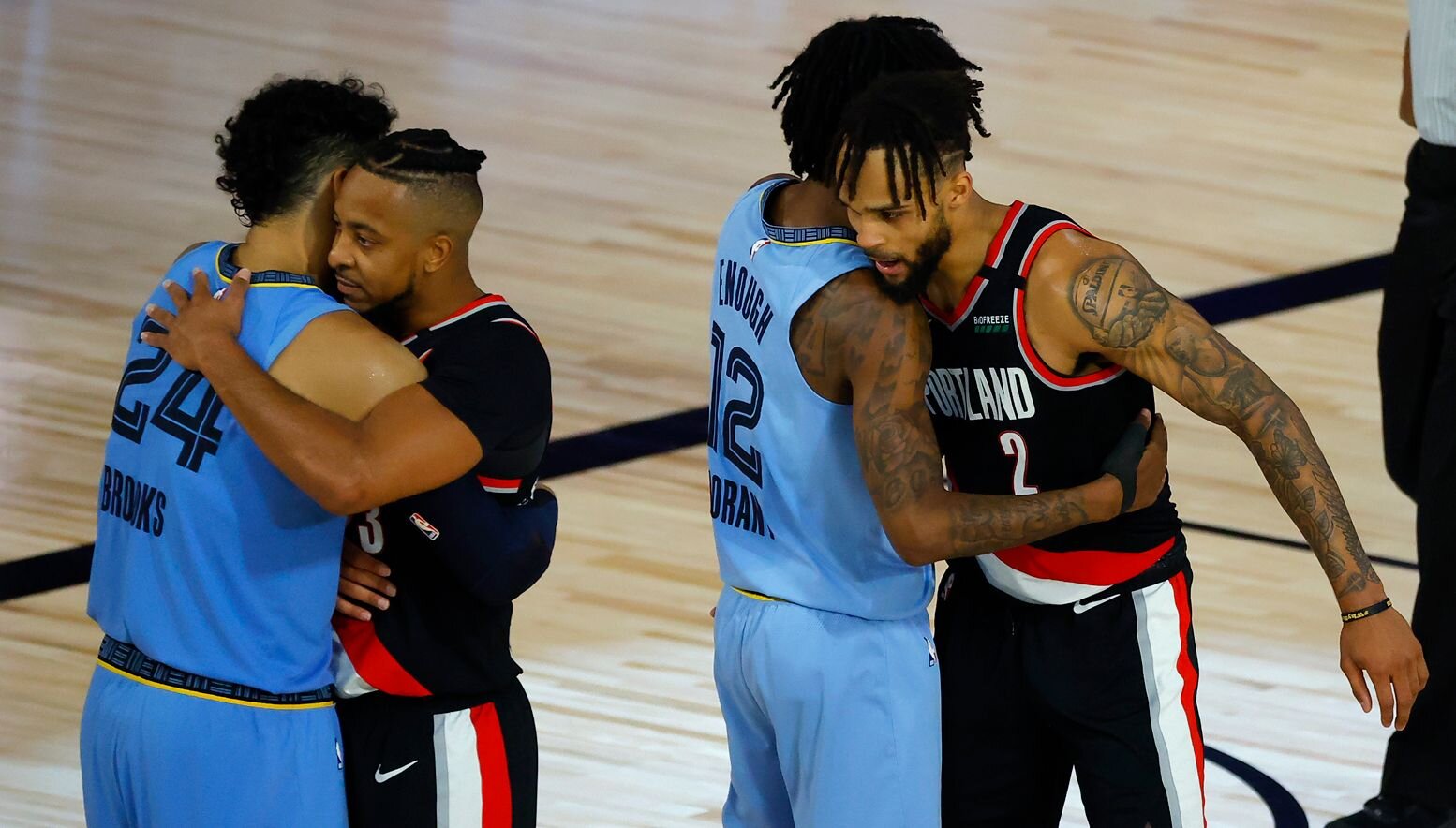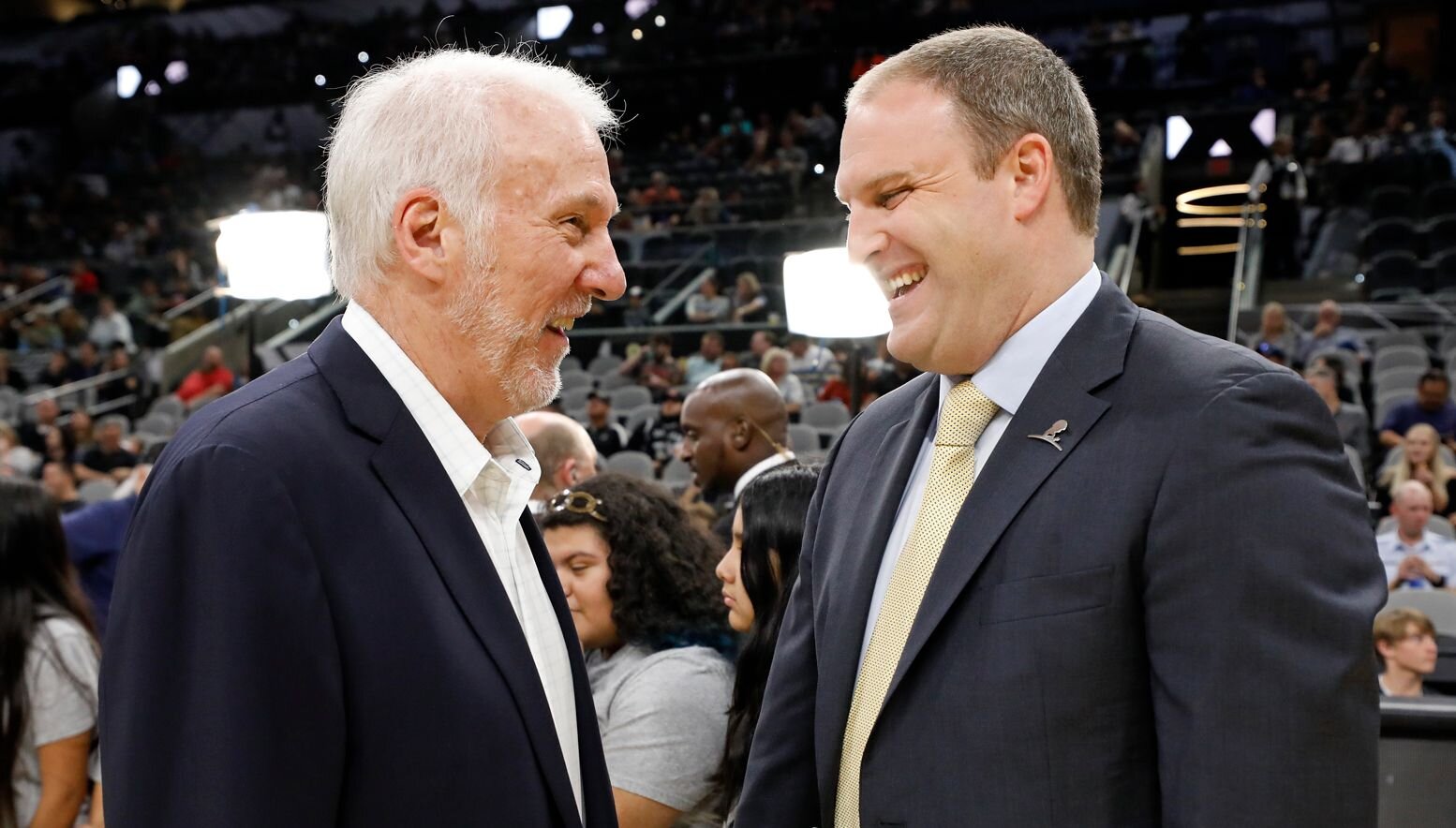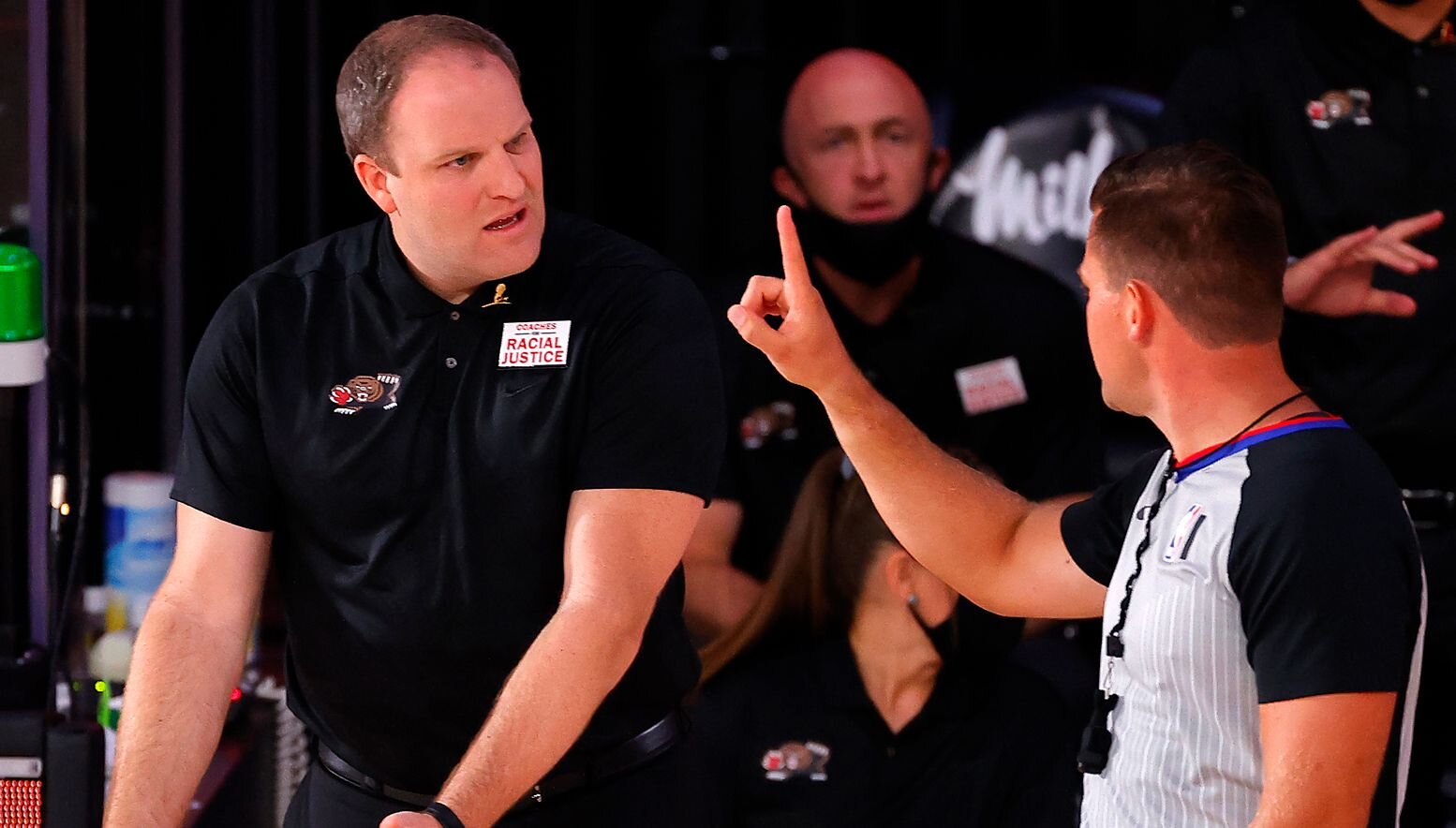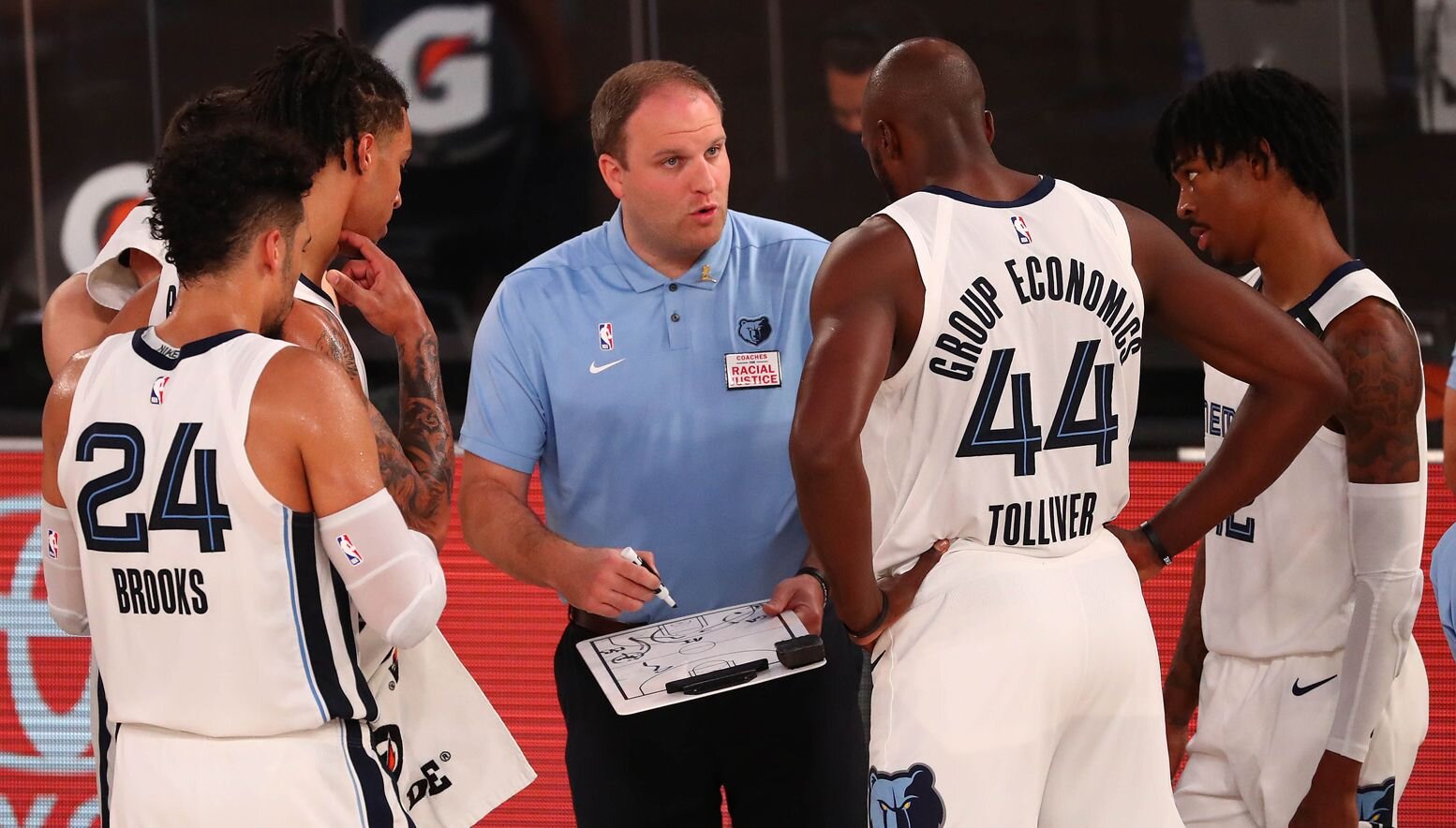“Keep playing!”
From my seat on the FedExForum press table, just a few feet behind where Memphis Grizzlies head coach Taylor Jenkins paces the sidelines, “Keep Playing!” is the phrase I heard Jenkins yell at his team more than any other throughout this past season. A call didn’t go your way? Shot rimmed out? Pass tipped off a defender? Forget about it, immediately. Instead, “Keep playing!”
“That ‘keep playing’ mentality means the game doesn’t stop, the game keeps moving,” says Jenkins, calling from his car two days after the Grizzlies’ season came to an end in the Orlando NBA Bubble. “What happens in the past or what happens to one player in a given moment won’t be the same thing in a future game, on the next possession, game to game.”
For a young team—the youngest team in the NBA—the occasional reminder that the grind never stops was certainly useful. After limping through the NBA seeding schedule in Orlando missing three rotation players (Jaren Jackson Jr., Justise Winslow and Tyus Jones) due to injuries, the young Grizzlies still managed to fight their way into a play-in game against the streaking Portland Trail Blazers. The out-manned Grizzlies lost, 126-122, but put on a thrilling show for their largest audience of the season, with Rookie of the Year Ja Morant pouring in 35 points in 42 minutes. The Grizzlies lost, but man did they leave it all out there.
What happens in the past or what happens to one player in a given moment won’t be the same thing in a future game, on the next possession, game to game.
Now back in the 901, the Grizzlies will take a moment to rest, to heal, and to reflect on the season that was. Nobody expected much from a rebuilding team with a first-year head coach, but the Grizzlies finished the season 34-39, in the playoff hunt out West, and proved pretty definitively that the wait for the next generation Grizzlies to grow up might not take as long as anyone suspected.
Grind City Media caught up with Taylor Jenkins last week just after leaving the Orlando NBA Bubble, where he said he was looking forward to being able to “enjoy family time, find that great work-life balance, and then I can’t wait to get back in the gym with our guys and get back to work.”
Grind City Media: Well, to begin I guess I should say welcome home.
Taylor Jenkins: Thank you!
GCM: This is kind of a weird question, but is it okay to feel good about that loss to the Blazers in the play-in game?
TJ: You can ask that and my response is probably going to be more that it’s a mixture of emotions. Obviously we’re disappointed in the loss, but to know how we competed in a game of that magnitude I’m proud of the guys. I’m going to kind of skate around it (laughs).
GCM: (laughs) I totally understand.
TJ: Because you never feel good after a loss or when you come away with those moral victories.
GCM: I know what you mean. Obviously the loss sucked, but it felt great to see the team in that situation and on national TV come out and play like that.
TJ: Oh man, yeah, on national TV, a play-in game, and then the whole time we’re playing without three of our better players. Our guys gave ourselves a chance against one of the hottest teams in the league. You just wish you’d come away with a W. If we had made it to the next day, I think Portland was going to be gassed. We still would have had a tough time, but man it’s those “what ifs” that come in sports.

GCM: You have a different background than a lot of coaches—going to Wharton and minoring in psychology. When did you know you wanted to be a basketball coach?
TJ: Right around college I recognized I wanted to coach basketball. I played sports growing up — baseball, soccer, basketball, and football for a year. I loved the energy of team sports, competing for something every single day. In college, I coached inner city kids for three of my four years, and just felt a different passion.
I still had the same love for the game and competing, but in a different role. I also loved teaching and being in those kinds of environments, so combining two of my passions—teaching and sports—coaching started coming to mind. Then the history kind of takes care of itself once I get my first opportunity.
GCM: I ask that because being an NBA head coach has been your goal for a while now. And you’ve been a G League head coach and an NBA assistant coach for a few teams, and this season you finally got your first chance to be an NBA head coach. So, what was it like to actually move over to that one seat? Was it significantly different? Or was it mostly the same things you’ve done, just on a bigger stage?
TJ: It’s different being the head coach. As you mentioned, being an assistant for so many years I still took an appreciation for what it meant to be a head coach. So when you do shift that seat over, it is different. Your emotions have to change, your perspective has to change, your work process has to change as well, and obviously at the end, the decision making you have to do for the greater good, for the entire team, that changes too.
Having really good experiences as an assistant coach and working with great head coaches prepares you for a moment like that. But your first year as a head coach, with all the new things you have to experience, it’s different than the ups and downs you witnessed as an assistant. Now you live them as a head coach. It’s different. There’s so many different ways you could describe it, but it’s an awesome experience to be in that leadership position and doing what you love.

GCM: You just mentioned trying to make decisions for the greater good of the team. During the games I sit right behind where you stand, and I see you’re basically in the middle of a storm with so much stuff happening all at once. How do you keep focused on that bigger picture and not get caught up in the moment on this bad call, this play, this shot? I hear you yell at the guys all the time, “Keep playing!” How do you keep yourself focused on that bigger picture?
TJ: I honestly think the greatest lesson I learned being an assistant, from watching the head coaches I worked for, is what it means to have a big picture mentality. It’s not just over the course of a season—it’s literally possession to possession as a coach. You’re constantly planning for that next moment, but also thinking ahead a few possessions or to the end of a quarter or how you’re going to finish a game, and not just living and dying by just one possession or the possession before.
GCM: So how do you prioritize and process all of that in the moment?
TJ: Well, obviously that current moment, that current decision you have to make, is the most important one, but it’s going to lead into the next decision you have to make, one after the other. So, taking on that big picture mentality of knowing the game keeps going, there’s going to be more opportunities, more hard times, more good times, more decisions to be made—you have to be able to weather that as a head coach.
It’s a long game, it’s a long season, not one moment is going to dictate your fate. At the end of a game, at the end of the season, you have final results for sure, but if you can focus on the totality of all those decisions you have to make or moments in time, hopefully more positive than negative, that leads to more wins and more victories and good things. So… it’s interesting. Sometimes you can’t just have someone sit down and just teach you that lesson.
GCM: You have put in the reps. You have to just do it.
TJ: You just have to experience it and witness it, then you have to take on your philosophy and way of teaching and communicating. The biggest thing is on how you coach—the words you use and how you handle certain moments of a game. One of the other greatest lines I ever got was don’t ever get too high and don’t ever get too low in moments. The easiest case is you win a game and you think you’re the best, and you lose a game and you think you’re the worst. That’s not going to be the case the next time around if you do what you’re supposed to do to get better.
GCM: I asked you about this earlier this season off the record, but speaking of having a bigger picture mentality, that also goes into your philosophy with using the coach’s challenges, right? I think you used three all season. Because for you it’s not really about the moment — one play, one call. It’s about the bigger picture. You’re trying to save the timeouts for down the road instead of getting upset over one call.
TJ: You know, yesterday I was even thinking about it coming out of the bubble. There were a couple of moments that I wanted to use it and I just wasn’t ready to make the call, but that’s an area I definitely know that I need to get better in and study it more and improve my process a little bit more and maybe take a little bit more risk. I’m definitely more conservative, more about the big picture and understanding. Is there a challenge in the first quarter, second quarter, third quarter that in the grand scheme of things could be a deciding factor? When I may need that timeout? Or if I lose that timeout then we might be in trouble towards the end of the game in a close game?
A couple of times I reflected in the bubble and I was like, Well, we did use two of those timeouts where I needed that last timeout. I think the times that I did challenge this year I was as close to 100 percent confident that I felt the call would go our way, but there’s definitely so many different ways to use that challenge. Is it to get a decision overturned? Is it to help a player in a moment? It’s trying to figure out, is that one possession worth it? I know I definitely can be a little bit more of a risk taker, and that’s something I’m going to work on during the summer.
GCM: Well, you did go two for three on them this season, so you were pretty good!
TJ: (laughs) Well, it’s not good enough—I’ve got to be three for three. That’s going to be my goal next year when I get them.
GCM: Hey, you miss all the shots you don’t take, right?
TJ: Exactly.

GCM: When do you think things really clicked for this team? It was a slow start and then all of a sudden in January it felt like the gas pedal hit the floor.
TJ: I don’t think there was one specific game. I’m a big believer in the process to get to that point. Obviously we took our L’s early in the season, but we didn’t stop working and I’ve said that all season long – when we were winning, when we were losing, when we’ve got a healthy team or are battling injuries, you’ve just got to keep working. Control what you can control every single day. I think it was just a matter of them having faith and trust in the work over the course of that early part of the season even though we weren’t getting the results we wanted.
Coming in every day, putting in the individual work, watching the film, having dialogues about knowing that we’ve got a young team, we’ve got a new team, we’ve got a new system. How are they going to feel comfortable in their roles in the system that they were playing in now? I think by the middle of December, we go out West on that four-game road trip. We started off with two losses and that can scream you’re going to go 0-for, you’re going to lose three in a row and now you’re going to lose four in a row on a tough West Coast trip.
We played against the Golden State team that was a hungry team that played hard. Obviously missing some of the best players in the league, but they still are competitive as heck. And then Phoenix, another competitive team, tough place to play and we hit those two wins and I think coming back off of that road trip our guys continued to have faith and just keep working. Now we’re starting to figure out this is how we need to play basketball every single day. It just took us a while. We just found a little bit more consistency in how we played and that naturally takes time in your first season, and especially with a young team. Then we carried it over into a pretty good ending to December and then a really good January.
The wins are obviously a good result. It shows that you’re doing things well and to have that consistency, but it’s also the day-to-day stuff that goes on beyond games. It’s what they were doing in the practices and what they were doing in their shoot arounds and in their vitamins and the film studies and everything. The guys just got more comfortable and tons of credit to the players, to our coaches, to our performance staff because everyone makes that possible. It’s not just one player, it’s not just the head coach. That’s really what got us there and it’s just that classic line, it just clicked. And it only clicked because you tried to flip the switch on enough times and eventually the light turns on.
GCM: Was there a specific play or moment this season when you realized that Ja Morant wasn’t your typical rookie point guard?
TJ: Oh man, there were so many moments even before we started playing games that I knew he was going to be special, just how gifted he was on the basketball floor. But everyone remembers the Brooklyn Nets game at home, him taking over the fourth quarter and overtime and obviously the biggest defensive stand up to that point in the season. One of the biggest defensive stands all season, with the blocked shot against Kyrie Irving. And then in overtime, the pitchback to Jae Crowder.
That one really stands out to me because I already had a really good feeling, but you’ve got to finally see it. Ja is all about winning. He’s all about doing the right thing for his team, whether that’s for him to go make a play, set up a teammate, make a play on a defensive man—it’s not all offense. To make that little pitchback in a crowd to Jae and let Jae take the game winning potential shot and then he makes it. How awesome was that?
GCM: Obviously there’s no way to know this, but going into the Bubble, do you think if you had known that the injuries were going to happen and you were going to be without three of your rotation guys, would you have approached the games differently or prepared differently?
TJ: I don’t think so. If we had known that we were going to have some guys out due to injury I think we would have tackled it the same way knowing that we were still in a great position to play meaningful games, to make this push to the playoffs, to give a great fight every single day, to put a cap on a really good first season. If guys were healthy and able to play, this is experience that’s invaluable for them for the future.
GCM: One thing I noticed from the team and specifically you during the Bubble was you guys being way more vocal about social justice issues—wearing the different shirts, making statements, things like that. It seems like you guys are embracing the opportunity to lead and stepping into this role a little bit.
TJ: It’s a movement in time that I think all of us have been trying to embrace in different ways. We all come from different backgrounds, have had different experiences and are trying to grapple with the stark and sad reality of the country and the history we’ve had of racial injustice. I think having the whole group together really empowered everyone to take the next step in this movement and understanding some of us don’t know what has happened in our country.
We think we know, and I’m a prime example. I feel like I’m educated on the injustices that have happened racially in our country—economically, socially—but I don’t have all the answers. And to be able to lean on each other—players leaning on coaches, coaches leaning on players and sharing our thoughts and really opening up our hearts and our minds, I think it was a huge step when you talk about the growth.
It’s sad that tragic events have to create this moment for you, but I think everyone really took it upon themselves knowing that we all can be difference-makers in this world, and especially difference-makers in our communities. How do we utilize these experiences together in a close proximity to raise awareness, to have continuing further education about racial injustice in our country and how do we then come out of this? That’s now the biggest next challenge for our growth. You’ve got this great platform; how do you now make a difference back in your own communities? We all come from different backgrounds, different cities, different hometowns, but Memphis is our home.
GCM: Last thing, what’s next?
TJ: Well, I’m going to go have lunch with Dillon Brooks right now. I’ve got some meals lined up with some players, some end of season conversations, talking about the summer, the next months, and then I’m going to probably take a week or so to just enjoy my family. The kids start school, so I’ll spend time with my wife and then get back to work. Find ways to get better, watching film, how do I help the players get better, how can I be a better head coach. Obviously we’ve got draft and free agency a couple of months away. Whenever we know we’re playing basketball games, we’re going to be ready for that.
The contents of this page have not been reviewed or endorsed by the Memphis Grizzlies. All opinions expressed by Lang Whitaker are solely his own and do not reflect the opinions of the Memphis Grizzlies or its Basketball Operations staff, owners, parent companies, partners or sponsors. His sources are not known to the Memphis Grizzlies and he has no special access to information beyond the access and privileges that go along with being an NBA accredited member of the media.
